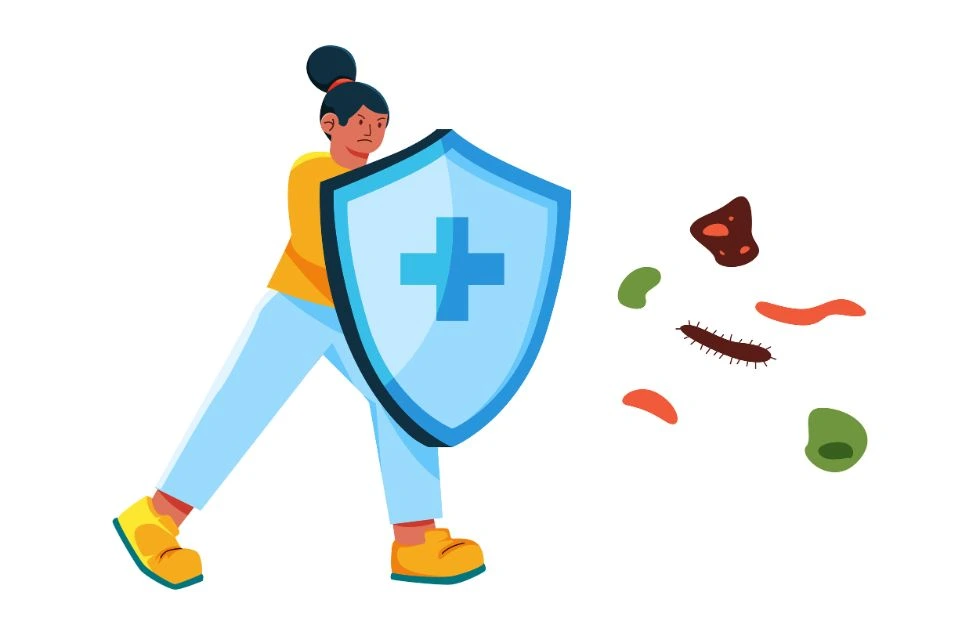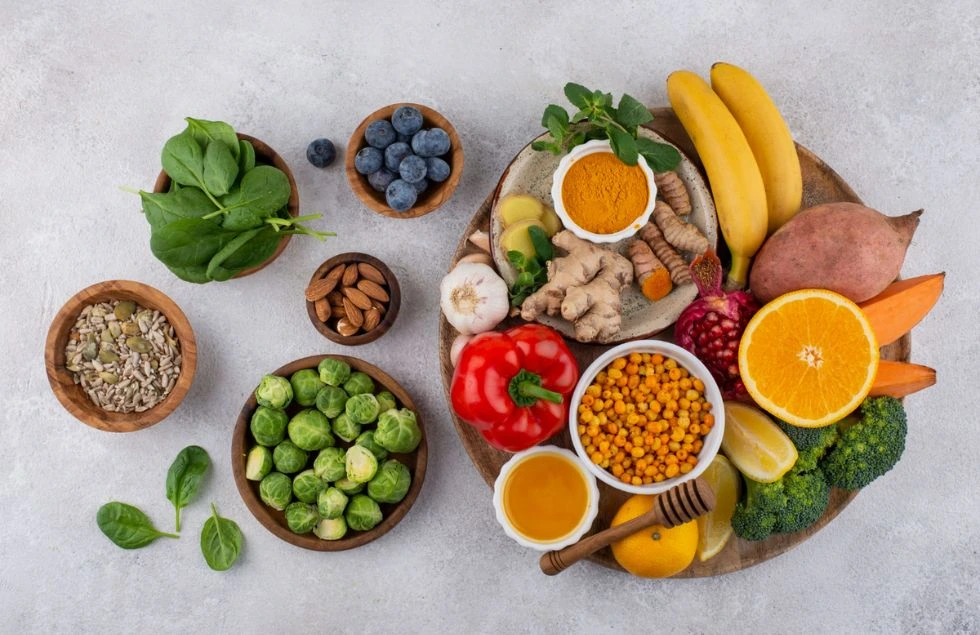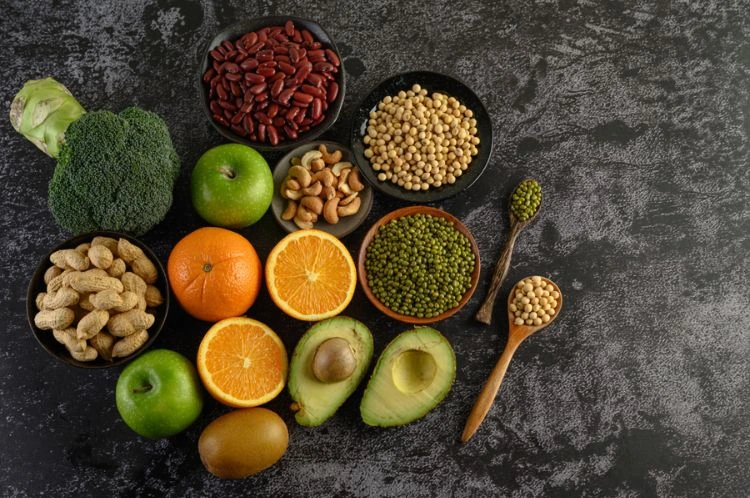‘A healthy immune system is a healthy body’
Our immune system is the protector of our body. It gets rid of any germs or viruses that can cause sickness and diseases. Unfortunately, most people realized the importance of having a strong immune system during times of widespread illnesses and pandemics.
The COVID-19 pandemic brought the concept of immunity into the limelight, with people realizing how crucial it is to maintain a strong defense against viruses and bacteria. This challenging period instilled in us the importance of prioritizing our health.
Now, more people have started taking their immune system more seriously. They are constantly seeking ways to improve their immunity. In this blog, we’ll explore the importance of the immune system, introduce you to superfoods that can help you get an immunity boost, and provide practical tips on how to incorporate these nutrient-rich foods into your daily diet.
Why is immunity important?
 Source: Freepik
Source: Freepik
A good immune system is important no matter your age. Let’s find out how good immunity can be beneficial for kids, youngsters, and older men:
- For kids, a strong immune system is vital to fight off common infections as they grow, helping them develop resistance to germs. It also helps reduce the frequency and severity of illnesses, allowing children to stay active and energetic.
- Youngsters rely on their immune system to maintain high energy levels, recover quickly from illnesses, and manage the stress of modern life. A well-functioning immune system can also help improve focus and productivity.
- As we reach older age, immunity becomes even more crucial as our bodies naturally become more susceptible to infections and chronic diseases. Maintaining strong immunity can help prevent age-related illnesses and improve overall quality of life.
Simple Tests To Check Your Immune System
If you are not sure about how good your immune system is you can perform a few immune system tests. Here are some of the common ones:
- Complete Blood Count (CBC):
It checks the levels of different cells in your blood, such as white blood cells (WBCs), red blood cells (RBCs), and platelets.
Why It’s Important: White blood cells are a key part of your immune system. If your WBC count is too low or too high, it can indicate that your immune system is not functioning properly.
- C-Reactive Protein (CRP) Test:
CRP is a substance produced by the liver in response to inflammation.
Why It’s Important: High CRP levels can indicate that your body is experiencing inflammation, suggesting an active immune response or an overactive immune system.
- Vitamin D Test:
The level of vitamin D in your blood, which is essential for a healthy immune system.
Why It’s Important: Low levels of vitamin D are linked to a weakened immune response.
The Rise of Immunity Awareness During COVID-19
The COVID-19 pandemic made immunity a hot topic as people sought ways to protect themselves and their loved ones from the virus. The sudden surge in demand for immunity-boosting products, vitamins, and supplements highlighted the growing awareness of the importance of a strong immune system. This shift also encouraged many individuals to adopt healthier eating habits and incorporate more nutrients-dense foods into their diets. A study by MedicineNet also claimed that people who were affected by COVID-19 and survived now have stronger immune systems.
So what are some of the ways to improve your immune system?
Regular exercise and a balanced diet, especially when you include superfoods in your diet, is extremely effective to boost your immunity.
Introducing Superfoods and Their Role in Immunity
 Source: Freepik
Source: Freepik
So how does a food qualify as a superfood?
Understanding Superfood
For a food to be considered a superfood, it needs to meet certain criteria:
- High Nutrient Density: Superfoods contain a high concentration of vitamins, minerals, and antioxidants per serving. For example, spinach is low in calories but rich in vitamins A, C, and K, as well as iron and calcium.
- Health Benefits: They offer proven health benefits, such as boosting immunity, reducing inflammation, and protecting against chronic diseases. Blueberries, for instance, are known for their ability to support brain health and reduce the risk of heart disease.
- Bioavailability: The body easily absorbs and utilizes the nutrients in superfoods, ensuring maximum health benefits. Turmeric, when combined with black pepper, enhances the absorption of curcumin, making it more effective.
Why Are Superfoods So Effective?
Superfoods are packed with immunity-boosting nutrients like:
Vitamin C plays a crucial role in strengthening the immune system by stimulating the production of white blood cells, which are essential for fighting infections.
Vitamin E is a fat-soluble antioxidant that protects cell membranes from oxidative damage. It helps prevent damage caused by free radicals and supports skin health.
These are some of the immune boosting vitamins. Along with vitamins…
Zinc is vital for the development and function of immune cells like T-cells and natural killer cells, helping the body fight off infections and heal wounds.
Omega-3 Fatty Acids found in fatty fish, flaxseeds, and chia seeds have anti-inflammatory properties that can help reduce chronic inflammation, which is linked to several diseases.
Antioxidants help you protect your immune cells from oxidative stress and support their ability to fight off infections.
All these nutrients when consumed in moderation strengthens the immune system and helps our body fight against viruses and diseases.
List of the Best Superfoods for Immunity
Here, we will list all the best superfood and then categorize them according to its accessibility, nutrient density and dietary preference:
- Blueberries
- Avocados
- Pomegranates
- Kale
- Spinach
- Chia Seeds
- Flaxseeds
- Lentils
- Ginger
- Salmon
- Eggs
- Dark Chocolate (70%+ cocoa)
- Coconut Oil
A. Based on Accessibility
 Source: Freepik
Source: Freepik
- Citrus Fruits (Oranges, Grapefruits, and Lemons): Citrus foods are a rich source of vitamin C, which boosts the production of white blood cells, helping the body fight infections. These fruits are simple to find year-round and are budget-friendly.
- Garlic: Contains allicin, which has been shown to enhance the immune response by stimulating white blood cells. Most grocery stores carry garlic, making it an affordable addition to your diet.
- Spinach: Packed with vitamin C, beta-carotene, and antioxidants, spinach helps strengthen the immune system and fight off infections. You can find fresh or frozen spinach widely and incorporate it into a variety of dishes.
B. Based on Nutrient Density

- Blueberries: High in flavonoids and vitamin C, blueberries have been shown to improve immune defense and protect against respiratory infections. They are among the most nutrient-dense fruits available.
- Chia Seeds: These tiny seeds are loaded with omega-3 fatty acids, fiber, and protein, all of which support overall health and immunity. Just one tablespoon of these seeds with water every morning is a perfect immunity drink.
- Turmeric: Contains curcumin, a compound with powerful anti-inflammatory and antioxidant effects that help strengthen the immune response.
C. Based on Dietary Preferences
For Vegetarians:
- Almonds: A fantastic source of vitamin E, which acts as an antioxidant and supports immune function. Vitamin E can enhance immune responses and provide protection against respiratory infections.
- Yogurt: Rich in probiotics, it enhances gut health, a factor closely associated with immune strength. Probiotics help stimulate the production of natural antibodies and immune cells.
For Vegans:
- Quinoa: A complete protein that provides all nine essential amino acids and supports immune health. It’s also rich in zinc, which plays a vital role in immune cell development.
- Flax Seeds: High in omega-3 fatty acids and lignans, which have anti-inflammatory properties. Omega-3s help regulate immune function and reduce chronic inflammation.
For Non-Vegetarians:
- Chicken Broth: Rich in vitamins and minerals that support immunity, and the warm liquid helps soothe sore throats. Research suggests that chicken broth may help reduce inflammation in the upper respiratory tract.
- Eggs: Packed with vitamin D and protein, which play a role in immune function and overall health. Vitamin D has been shown to enhance pathogen-fighting effects of monocytes and macrophages.
The Role of a Balanced Diet in Immunity
A balanced diet is crucial for maintaining a healthy immune system, as it ensures you get all the nutrients your body needs to function properly. Superfoods are just one part of the puzzle. To achieve optimal immunity, your diet should include the following foods:
- Proteins: Vital for building and repairing tissues and for producing antibodies and immune cells.
- Healthy Fats: Omega-3 fatty acids found in fatty fish, chia seeds, and walnuts help reduce inflammation and support immune health.
- Complex Carbohydrates: Whole grains, fruits, and vegetables provide energy and essential nutrients that support immune function.
Sample Diet Plan:
- Breakfast: Oatmeal with berries, a spoonful of nut butter, and a sprinkle of chia seeds
- Mid-Morning Snack: A banana with a handful of nuts
- Lunch: Grilled chicken or tofu salad with mixed greens, avocado, and olive oil dressing
- Afternoon Snack: Greek yogurt with honey and almonds
- Dinner: Baked fatty fish with roasted veggies and quinoa
- Post-Workout: Protein shake or a boiled egg with a slice of whole-grain toast
How to Incorporate Superfoods into Your Daily Diet
Start Your Day Right:
- Add blueberries or chia seeds to your morning smoothie or sprinkle some flax seeds over your oatmeal.
- Include a glass of warm water with lemon and ginger to kickstart your metabolism and boost immunity.
Smart Snacking:
- Swap processed snacks for a handful of almonds, walnuts, or sunflower seeds.
- Enjoy Greek yogurt with a drizzle of honey and a few slices of banana.
Meal Prep Made Easy:
- Include leafy greens like spinach or kale in your salads or as a side dish for lunch and dinner.
- Use turmeric, garlic, and ginger as spices in your meals to add flavor and enhance immunity.
Hydrate with a Twist:
- Infuse your water with slices of citrus fruits, cucumber, or a few fresh mint leaves.
- Try green tea, which is rich in antioxidants, as a healthy alternative to sugary drinks.
Creative Recipes:
- Try a superfood salad with spinach, avocado, blueberries, nuts, and an olive oil dressing.
- Make a stir-fry with broccoli, bell peppers, garlic, and ginger, paired with grilled salmon or tofu.
Incorporation of superfoods in your diet along with regular exercise will boost the immunity system fast. Along with balanced diet and exercises, there are also immunity boosting supplements that can further help you improve your immune system functions.
Common Misconceptions About Superfoods
Here are some of the common misconceptions related to superfoods:
Myth #1: Superfoods can replace a balanced diet
Myth #2: Superfood are a all-cure
Myth #3: Fresh Superfood are always better than frozen or dried versions
Myth #4: Superfood are exotic and expensive
Myth #5:Eating more superfood means more health benefits
All of these myths are not backed by any scientific research. Let’s burst these myths with science-backed facts.
1. Superfoods can Replace a Balanced Diet
- Misconception: Eating superfoods alone is enough to maintain health, and they can replace a balanced diet.
- Reality: Superfoods are nutrient-dense but should be part of a varied diet that includes proteins, carbohydrates, fats, vitamins, and minerals to meet all nutritional needs.
2. Superfoods Are a Cure-All
- Misconception: Superfoods have miraculous health benefits and can cure diseases or health issues on their own.
- Reality: While they are rich in nutrients, no single food can prevent or cure diseases. A combination of a balanced diet, regular exercise, and a healthy lifestyle is necessary for overall well-being.
3. Fresh Superfoods are Always Better than Frozen or Dried Versions
- Misconception: Fresh superfoods are more nutritious than their frozen or dried counterparts.
- Reality: Freezing or drying preserves most nutrients, and frozen superfoods can be as nutritious or more so than fresh ones because they are frozen at peak ripeness.
4. Superfoods Are Exotic and Expensive
- Misconception: Superfoods are rare, imported, and costly items like goji berries, chia seeds, or acai berries.
- Reality: Many affordable, locally available foods like spinach, broccoli, apples, and almonds are equally rich in nutrients and can be considered superfoods.
5. Eating more Superfoods means more Health Benefits
- Misconception: The more superfoods you consume, the healthier you’ll be.
- Reality: Overconsumption can lead to excessive intake of certain nutrients, which might be harmful. Balance and moderation are key to reaping the benefits of superfoods.
Additional Lifestyle Tips To Strengthen Your Immunity
“Four components keeping your immune system healthy are nutrition, exercise, breathing and meditation.” – Anna Boroch
1. Regular Exercise
Engaging in regular physical activity boosts circulation, helps immune cells move through your body more efficiently, and reduces inflammation.
You can workout in the gym or at home depending on your lifestyle. If you are a beginner, you can start with walking or jogging near your locality. Yoga, cardio and pilates are another amazing option for beginners.
2. Adequate Sleep
Sleep is crucial for immune function, as it allows your body to produce infection-fighting antibodies and cytokines. Adults should aim for 7-9 hours of quality sleep each night to support their immune system.
Here are some of the tips you can use to sleep peacefully every night:
- Don’t use your phone or PC 30 minutes before sleeping.
- Sleep in a dark room.
- Read self-help or spiritual books before sleeping so that you can end your day on a positive note.
- Wash your face and feet before sleeping.
3. Manage Stress Levels
Chronic stress can weaken the immune system by increasing the production of stress hormones like cortisol, which can reduce the effectiveness of white blood cells. Engage in relaxation techniques like meditation, yoga, deep breathing exercises, or hobbies that help you relax. Having good mental health is crucial for a strong immune system.
4. Stay Hydrated
Water can solve almost every problem in your body. Proper hydration is essential for maintaining a healthy immune system, as water helps carry oxygen to cells and flushes out toxins. Drink at least 8 cups (about 2 liters) of water daily, and more if you’re physically active or in a hot climate.
5. Avoid Smoking and Limit Alcohol Consumption
Smoking weakens the immune system and makes it harder for the body to fight off infections. Excessive alcohol consumption can suppress immune function and dehydrate the body. If you are a smoker, consider quitting or at least reducing the amount of tobacco you smoke. Limit alcohol intake to moderate levels.
Final Thoughts
Boosting your immunity is not about making drastic changes but rather incorporating small, consistent habits into your daily routine. By including superfoods like citrus fruits, spinach, garlic, and nuts in your diet, you provide your body with the nutrients it needs to stay strong and fight off infections. Remember, a balanced diet, regular exercise, and proper sleep are equally important in maintaining a healthy immune system.
Start today by adding one or two superfoods to your meals, and gradually build up to a diverse, nutrient-rich diet that supports your overall well-being.
If you want to start your health and fitness journey, you can read more blogs by Stay Fit Stay Healthy.
FAQs
1. What are the best foods to boost the immune system?
The best foods to boost the immune system are rich in essential vitamins, minerals, and antioxidants that help protect and strengthen the body’s defenses. Some of the top immunity-boosting foods include:
- Citrus Fruits (e.g., oranges, grapefruits, lemons)
- Garlic
- Ginger
- Spinach
- Almonds
- Yogurt
- Turmeric
- Fatty Fish (e.g., salmon, mackerel)
Including a variety of these foods in your diet ensures you get a wide range of nutrients that help keep your immune system strong.
2. How does Vitamin C help fight infections?
Vitamin C is crucial for a well-functioning immune system and helps fight infections in several ways:
- Boosts White Blood Cell Production: Vitamin C stimulates the production of white blood cells, such as lymphocytes and phagocytes, which help protect the body against infections.
- Enhances White Blood Cell Function: It supports the ability of these immune cells to function more effectively, allowing them to identify and eliminate harmful pathogens more efficiently.
- Acts as an Antioxidant: Vitamin C protects immune cells from damage by neutralizing free radicals, which can weaken the immune response.
- Supports Skin Barrier Function: It helps strengthen the skin, the body’s first line of defense, by promoting collagen production, making it harder for pathogens to penetrate.
Regular intake of vitamin C-rich foods like citrus fruits, bell peppers, broccoli, and strawberries helps maintain a strong immune system and better resistance to infections.
3. How long does it take to improve your immune system?
The time it takes to improve your immune system varies depending on your overall health, lifestyle changes, and consistency in adopting healthy habits. Initial improvements can be seen within a few weeks if you start eating a balanced diet rich in nutrients, exercising regularly, staying hydrated, and getting enough sleep.
Long-term strengthening of the immune system can take several months of consistent healthy living. For example, studies show that significant improvements in immunity can be observed after 8-12 weeks of regular exercise and a nutritious diet. It’s important to remember that building a strong immune system is an ongoing process and requires a sustained commitment to healthy habits.
4. Can you strengthen your immune system naturally?
Yes, you can strengthen your immune system naturally by adopting the following lifestyle changes:
- Eat a Balanced Diet: Incorporate a variety of fruits, vegetables, whole grains, lean proteins, and healthy fats into your diet to provide essential nutrients like vitamins C, D, E, and zinc.
- Stay Physically Active: Regular exercise improves blood circulation, reduces inflammation, and enhances immune function.
- Get Enough Sleep: Aim for 7-9 hours of quality sleep each night to support the body’s ability to fight off infections.
- Stay Hydrated: Drinking plenty of water helps flush out toxins and supports immune cell function. By consistently incorporating these habits, you can naturally boost your immune system over time.
5. Is there a superfood that boosts immunity overnight?
No, there is no single superfood that can boost immunity overnight. The immune system is complex, and it requires a balanced intake of various nutrients over time to function optimally. While superfoods like citrus fruits, garlic, ginger, and turmeric are known for their immune-boosting properties, they need to be consumed regularly as part of a healthy diet to have a significant impact. Think of superfoods as part of a long-term strategy to support your immune health, rather than a quick fix.

